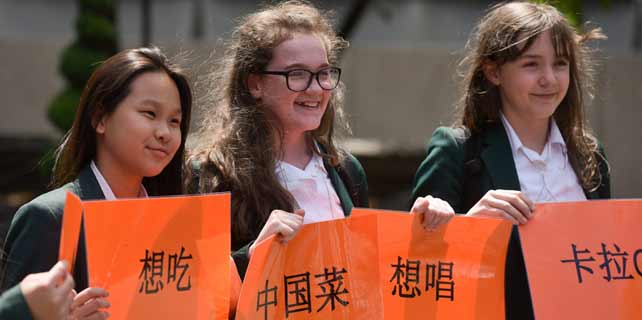Making biodegradable plastic fantastic for more shoppers
Yu Haiming has moved his high-tech company into producing plastic bags that are less harmful to the environment.
The chairman of the Dongyuan Scien-Tech Co Ltd is on a mission to cut down on pollution by rolling out more eco-friendly models for busy shoppers.
"They will biodegrade within 90 days once they are thrown away," Yu said. "Only traces of carbon dioxide and water will be left."
Founded in 2008, Dongyuan Scien-Tech is based in Wuhai in North China's Inner Mongolia autonomous region and employs about 3,000 people.
The group's key business is the chemical and plastics industry although the company has yet to disclose detailed financial figures.
Since 2012, it has invested 6.3 billion yuan ($899 million) into its operations and expects sales revenue to reach 43 billion yuan annually by 2022.
As the group expands, it aims to increase its production of PBS, or polybutylene succinate. This is a key component for making biodegradable plastic bags and mulching films, which suppress weeds and conserve water in crop production.
"We produce 20,000 to 40,000 metric tons of PBS per year," Yu said. "But we expect to reach 200,000 tons annually within three years.
"This will cut out 350 million tons of plastic waste a year," he added.
Still, there will be challenges ahead for the company.
Biodegradable plastic is more expensive, so the costs are naturally passed on to the customer.
Yu confirmed that sales of the new eco-friendly bags in Zhejiang and Jiangsu provinces had been disappointing because of the higher price.
"A regular size biodegradable bag from supermarkets will cost about 1 yuan, while the old ones will be 0.5 yuan," Yu said.
To stop this dip in sales, Dongyuan Scien-Tech hopes to trim costs by linking up with the Chengdu Institute of Organic Chemistry under the Chinese Academy of Sciences.
With the help of the academy, Yu is confident his company can produce a highly-competitive new age shopping bag.
"The aim is to make the biodegradable plastic cheaper, so it's attractive to shoppers," he said.
"At the moment biodegradable bags make up less than 7 percent of the plastic bags used in China," Yu added.
In 2008, the government banned free plastic bags in supermarkets, stores and markets in a bid to curb pollution.
Nine years later, customers are still using them in vast numbers, Liu Junhai, a professor at the Law School of Renmin University of China, told China Youth Daily.
"The purpose of the ban was to contain the use of polluting plastic bags, but manufactures are still producing them, retailers are still selling them and consumers are still using them," Liu said.
Yu hopes to eventually change that mentality by making the new biodegradable bags cheaper and more appealing to customers.
He plans to roll out more cost-effective products later in the year.
"I'm not the one who developed the PBS technology, but I want to be the one who makes it possible for common people to afford it," Yu said.
Contact the writer at zhangyu1@chinadaily.com.cn
- Minister says eco-friendly plan key to Xiongan New Area
- Financial loan contract dispute between Mianyang-based Yudu Industrial Co, Ltd, Mianyang Branch of Industrial Bank Co, Ltd, Shanghai-based Yudu Investment (Group) Co, Ltd, Sichuan-based Qianfoshan Eco-tourism Development Co, Ltd, Liu Li and Zhang Jun
- Eco-farmer nurtures dreams of tourism
- Eco forum pushes green development in Guizhou
- Guizhou to take lead in eco-healthcare plan






















